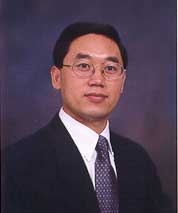Ping Wang has an educational background in biochemical engineering and a research focus on nanotechnology and enzyme engineering. Benefiting from the latest advances in enzymology, nanoscale science and materials technology, he explores powerful biocatalysts for biomanufacturing and bioenergy.
Conceiving and realizing nature-inspired multienzyme reaction pathways in vitro for important biotransformations is one major thrust in his research. That involves the discovery and activation of enzymes to drive desired transformations under intensified engineering environments for production of value-added chemicals, fuels and materials from renewable materials.
Functional and smart biomaterials and coatings are another important area in Wang's research, especially surface functionalities and activities realized by using enzymes and proteins. A recent research in Wang’s lab demonstrated the development of thin plastic films containing active enzymes with potential applications such as self-cleaning and antimicrobial materials.
Other research activities in Wang's lab cover a wide range of enzyme engineering and nanobiotechnology, including studies on enzyme activation, stabilization and functionalization via both protein engineering and nanotechnology; development of cell-free biosynthesis pathways, carbon capture and artificial photosynthesis, bioremediation, biosensors and targeted enzyme-activated drug delivery systems; as well as bioenergy technologies using bio-based nanostructured carbon electrodes for energy storage, and biofuel cells for direct power generation from biochemical and biomass.
